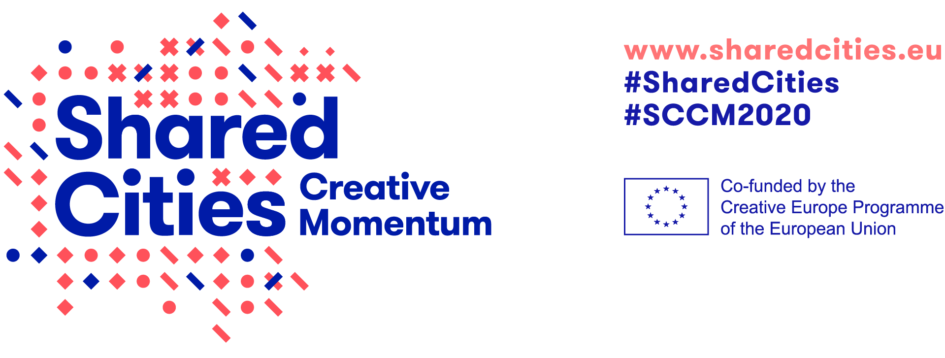Shared Cities: Creative Momentum is a seminal four year cultural project that brings together eleven partner organisations from major cities throughout Central Europe – Belgrade, Berlin, Budapest, Bratislava, Katowice, Prague and Warsaw. With this project we strive to bring together people and communities involved in cultural, social and architectural activities aimed at redefining the public sphere and communal spaces in cities.
The activities carried out by Katowice City of Gardens and Medialab Katowice include studies involving the analysis and visualisation of Katowice’s cultural data. Below are links to pages containing detailed information about individual components of the project:
- The main website containing information about the project and activities of individual institutions (link).
- Information about the concept of studying Katowice’s culture (link).
- A Research Blog accompanying our studies, where we share prototype solutions, detailed information about the progress and methodology of our work as well as reports from workshops and interviews with invited experts (link).
- A list of events held as part of the project, including workshops, lectures, discussions and open workgroup meetings (link).
- A website dedicated to research microgrants provided as part of Shared Cities (link).
About Shared Cities
Our cities, burdened by their historic legacies, require urgent solutions in tackling the dilemmas that they face: inefficient investment, neglected housing projects, housing shortages and a lack of accountability and transparency in decision-making haunt our urban spaces. Only by involving citizens, politicians, investors and professionals we can make meaningful, positive changes.
By utilising the creative potential of residents, communities, activists, artists, cultural actors, social scientists and their networks, supported by the ample opportunities brought by ubiquitous mobile computing and social media, we will foster innovative solutions. We aim for our approach to activate a ‘creative momentum’ that will increase the quality of life in European cities.
This project will be crucial in giving those citizens who care about the shared aspects of their cities a chance to discuss their ideas and hopes for these urban spaces. We hope to empower them to make these spaces not only lived in but loved by their inhabitants and communities.
An array of events will be created by Shared Cities, over one hundred and fifty in total, encompassing festivals, films, exhibitions, workshops and artists’ residencies. They will all focus upon the project’s core themes of sharing, cultural development and alternative planning and architectural visions. A small sample of these events includes planning games (featuring challenges for architects and citizens to design their ideal cities together) and hackathons for street furniture (where artists and the public will devise creative and radical new forms and uses of street furniture).
We are also pleased to announce large-scale urban design research projects, five in total, focusing on captivating and contemporary issues. These include projects such as a newly constructed digital map in Katowice, emanating from research about informal actors related to cultural and creative industries, which is proving increasingly essential before formulating strategies for such industries.
Others include themes such as strategies for reviving the iconic ruins of the communist era and the development of ‘shared governances’ in Budapest that will test ways that NGOs can embrace the complex process of reinvigorating a former industrial area of Csepel Island – by creating and blending online and offline means for participation.
Another will utilise public experts in Bratislava by forging practices in which NGOs can develop public spaces – in this case the largest square in Bratislava, Námestie SNP. These exemplary projects combine international experience with local knowledge of the conditions in Central Europe’s cities. This will be a precedent-setting and invaluable prototype for future schemes.
Shared Cities will also address innovative ways to publish, display and communicate what we create within ‘curatorial labs’. Within these labs, professionals and the public will exchange ideas about how to utilise data-driven design for superior public engagement and methods such as using films to convey architecture and culture as a whole in new and exciting ways.
By the end of the year a common web platform will be launched to kick-start this project, in addition to an annual magazine published from 2017 onwards, bringing together our work and progress. At the end of the project, a travelling exhibition and film will share the results of the entire project throughout all the Partners, the worldwide network of the Goethe-Institut and Czech Centres to share its knowledge and accomplishments.
Shared Cities: Creative Momentum is a European cultural platform addressing the urban challenges of contemporary European cities. SCCM is a joint project of Goethe-Institut (DE), Czech Centres (CZ), reSITE (CZ), Academy of Fine Arts and Design in Bratislava (SK), Association of Belgrade Architects (RS), Contemporary Architecture Centre (HU), Katowice City of Gardens (PL), KUNSTrePUBLIK (DE), Mindspace (HU), Old Market Hall Alliance (SK), Res Publica – Cities Magazine (PL). Co-funded by the Creative Europe Programme of the European Union. Local partner: Regional Institute of Culture in Katowice.
